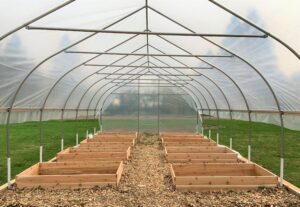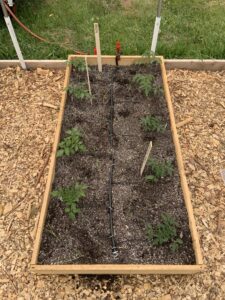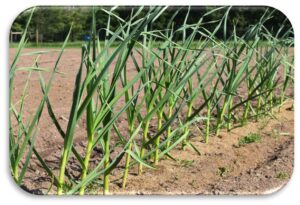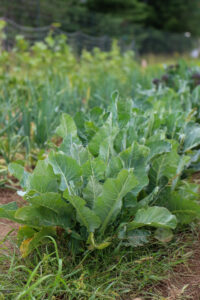Progress report for LNC22-466
Project Information
The Producer Training Program (PTP) provides an invaluable opportunity for individuals who want to grow food for their community in a sustainable, agroecological manner, to innovate such asdeveloping unique environmental degradation techniques such as using manoomin hull mulch. At the heart of our program – focused on Indigenous principles of ecological reciprocity and agroecological management practices, Gitigaaning is a 36-acre organic farm located on Fond du Lac reservation. TheFond du Lac Band of Lake Superior Chippewa generously donates 4-acres to the Producer Training Program each year, understanding that access to land in our region is limited. Per capita income for Carlton County is $18,073 per annum and with a cash rent of $26.00 per acre of farmable land often without supporting infrastructure, it is a large barrier of access for many emerging farmers and could explain the reason why there is only 1.7% of Native American producers.
The PTP not only provides educational opportunities through classes, workshops, and farm tours, but provides access to land and aids to currently over 40 beginning producers in scaling up their farm businesses. At the end of 2020, the Fond du Lac Band added a community kitchen, Na’enimonigamig, an all-season growing dome, irrigation, and fencing to Gitigaaning. It is through our strong community connections that we are able to leverage this new infrastructure to expand our program participation and incorporate resiliency and mindfulness practices into our program. Feedback from the PTP producers informs the support and education that advances the food sovereignty goals of the community.
With the addition of new research programming on manoomin (wild rice) hull mulch, we are incorporating ecosystem thinking that is a keystone of Gitigaaning. The wild rice hull mulch research will measure the impact of this traditional resource on ecosystem health that has the potential to alleviate environmental degradation, provide climate crisis mitigation, and preserve the natural resources of NE Minnesota. In providing access and resources, as well as research, we aim to grow the production of value-added products and better understand the ecological impacts of traditional and sacred foods (manoomin, three sisters, etc.)- thereby creating a sustainable food system; from farm to fork.
Producer Training Program Education Project
Learning outcomes for our education programming include expansion of skills regarding ecologically sound organic practices, best practices for personal and community mindfulness coping strategies.
Action oriented outcomes for our education programming focus on engaging farmers with research,growing food, and decision-making focused on the food sovereignty needs of the community.
Manoomin Research Project
Learning outcomes will focus on answering three questions about hull impact on;
- soil moisture
- Weed suppression
Research Action outcome will be knowledge contributions that support sovereignty of manoomin on Fond du Lac Reservation, by providing revenue streams for wild rice producers.
Our proposal builds on the success of the Producer Training Program (PTP) to increase knowledge of best organic practices and establish resiliency and wellness capabilities. In 2020-2021, the Fond du Lc Band invested in agricultural infrastructure at Gitigaaaning including fencing, irrigation, large – scale farming equipment, and a community kitchen. This added infrastructure will help out PTP program grow and support small-scale producers in learning how to grow food, methods of harvest, conservation techniques, and provide place-based healing opportunities. We have seen the positive effects that land access and resources have had on the food sovereignty of the Fond du Lac community. We aim to expand food sovereignty programming through intention and practical application of agricultural knowledge, ecologically sound methodologies, additionally, research of wild rice hulls is a natural fit for the agroecological cultivation techniques practiced at Gitigaaning.
Research
Our hypothesis for our research question is that using wild rice dried husks ( mazaanag) as an organic mulch will help with soil moisture and weed suppression.
The sole objective of the PTP is to provide access and education for Fond du Lac community members to become engaged in growing, cultivating, and harvesting nutritious food, and creating a sovereign, holistic food system rooted in Anishinaabe values that is environmentally responsible and empowers a thriving, resilient community. This intention is embedded in our approach.
Over the last three years, we have built a program that provides training, connection with regional farmers, and access to land for community members to learn organic farming principles. Our proposal will build on this program to support successful expansion of Native American owned agricultural businesses. We will continue working directly with farmers outside of Fond du Lac Reservation to host mentors for our Indigenous led PTP. It is through our deep understanding that cultivation and education come first, that our producers will be able to leverage their knowledge to meet the needs of their families, creating a more resilient community. Our producers and partners benefit in a multitude of ways, whether it’s through knowledge exchange, cross promotion of farming businesses, or expanding theunderstanding of size, scale, and organic practices of local farms.
Our project will provide classes once a week from February to September on subjects such as: soil health, cover crops, crop diversity, organic transition methods, integrated pest management, foodand farm safety training, orchard management, seed saving, marketing and value-added productsand a variety of others depending on the farmer’s needs. With funding support, we will incorporate mindfulness classes into our curricula; promoting resilient, holistic and healthy practices for the whole family. We will offer wellness classes throughout the season in which participants are encouraged to bring their family, breathing exercises, and mindful eating practices. Additionally, inthe spring, land is prepped via soil testing and amendments, and segmented into 1/16-1/4-acre plots for each producer. During this time, John Fisher Merritt of Food Farm and the project coordinator Erika Reséndiz will be available for guidance and help for producers as they plant their plot sections. During the growing season the program will host hands-on expert led lectures and trainings on site atGitigaaning and Na’enimonigamig Kitchen/Cannery. These hands-on trainings include how to use equipment (ex. tractors and tillers) and growing methods to model successful organic growingtechniques. Our program is looking to use Fond du Lac Na’enimonigamig to encourage ourparticipants to prepare produce, practice healthy eating and preserving, and act as an extension to the growing season in its root cellar and walk-in freezer.
During our first year of funding, we would like to expand education and science-based research opportunities for our community members. We believe Gitigaaning offers a unique opportunity to research the effectiveness and impact of using wild rice hulls as mulch on cultivated crops. In partnership with Fond du Lac Tribal & Community College (FDLTCC) research students we will answer questions on the impact of wild rice hulls (a biproduct of harvest) on water conservation and retention, and weed suppression. With the cooperation of PTP participants we will conduct both in situ and lab-controlled experiments on wild rice hull mulch on both crops and the surrounding land. Some questions that we would like to answer:
- Is wild rice mulch an effective method of retaining soil moisture?
- How does wild rice mulch contribute to weed suppression?
Our second and third years of funding will continue current research to ensure the efficacy of our results and will also focus on building relationships with the new Fond du Lac Agriculture Division to continue providing land access and education materials to Native producers. As the Producer Training Program enters its fourth year, we understand the value of diversifying the narrative. Our program will send our producers to conferences such as the Emerging Farmers Conference, Inter-Tribal Agriculture Summit, and the Midwest Organic and Sustainable Education Service conference; we will organize regional and statewide farm tours to connect experienced and beginning farmers, the program coordinator and farm mentor will lead one on one consultations with producers, connecting them with resources and support based on their specific needs. With this expansion comes the need for more educators, electronic resources, and materials to provide effective outreach.
During the 2022-2023 research year we started the process by meeting the Producer Training Program participants during their February 2023 Orientation meeting. During this meeting we gauged interest in participating in the research project, specifically who would allow us to take plot measurements during the growing season. We also listened to the observations of the producers that have used rice hulls in previous growing seasons and their experiences with using the rice hulls in the field at Gitigaaning Farm. Taking their input we drafted protocols for measuring soil moisture and weed suppression on garden plots both in our new FDLTCC High Tunnel and at producer plots at Gitigaaning Farm. In Spring and Summer of 2023 the Research Team built eight raised beds in the FDLTCC High Tunnel to set up the experimental design. Our research team visited the Gitigaaning Farm to look at the intersections between growing conditions and the vegetables grown in situ. We are trying to replicate as much as possible potential conditions in our raised beds that our producers would encounter at the Gitigaaning Farm. I have attached our protocols and photos of the infrastructure built in the spring and summer of 2023.
2024 Draft Rice Hull Protocols


The 2022-2023 growing season was spent building capacity in both research outreach and infrastructure. We were not able to obtain the rice hulls until late July 2023. At that point the research staff decided we would continue with prepping the spaces for the experiment to start in spring 2024. Staff attended the February 2024 Producer Training Program Orientation meeting. During this meeting the planting spaces, Gitigaaning Farm plot maps, and growing priorities were discussed. This information is being used to identify a common crop. This year it seems that corn will be our common crop. We are working with the Producer Training Program to identify the corn varieties that will be the most common at Gitigaaning Farm.
Education
The Producer Training Program (PTP) provides education opportunities through classes, workshops, and farm tours. This program is grounded in food sovereignty and is one piece of the holistic concept of harvest in the Anishinaabeg community. An important aspect of the Producer Training Program is the access to land for 40 beginning producers. This access to land also means providing seeds, tools, irrigation, and equipment to those that cannot purchase these resources.
Our program starts months before growing season. Building a strong knowledge base with workshops and hands-on learning, our Producer Training Participants are provided with the information needed to successfully plan, prep, and implement a garden plot. The supplies that they are provided includes books, seed starting supplies, seeds, tools, and soil. The Participants are connected with a mentor to help them plan out an efficient growing plan, think about companion planting, and implement best practices for healthy soil. In June all the plots at Gitigaaning are planted and a farm mentor is on hand to advise on soil building, mulching, integrated pest management, and weeding practices. Classes on Farm Safety, cover crops, garlic planting, and farm tours happen during the growing and harvest season. Our program finishes out the year by offering seed saving workshops and food preservation.
Project Activities
Educational & Outreach Activities
Participation Summary:
Educational Tools:
Producer Training Program Manual
On Farm Demonstrations:
Farm Safety and Tractor Operation ( this was offered twice)
Farm Tool Maintenance with hands- on cleaning practice.
Garlic Planting presentation and garden plot planting at Gitigaaning
Caring for Fruit Trees - presentation and hands-on practice at Gitigaaning orchard
Importance of Cover Crops- NRCS touring soil demonstration table at the Wiikondiwag Gitigaaning (Farm Feast)
Presentations:
Investigating the Impact of the Mazaanag on Soil Health. Presented by Erika Resendiz Alonso at the 2023 Indigenous Farming Conference in White Earth, MN
Work Shops:
Salve Making with Plant Helpers
Seed Rematriation: Bringing our Relatives Home
Postpartum Gifts from Mama Aki
Seed Starting and Garden Planning
Fermentation
Mandarin : From Hominy to Corn Husk Dolls
Gardening with Children in the Language
Garden Tool Maintenance
The Principles of Soil Health
Nutrient Run-off
Caring for Fruit Trees and Shrubs
Farmers/Ranchers participants
There were 38 Producer Training Program participants in the 2023 co-hort.
Agricultural Professionals
NRCS staff (3)
UMN Extension (2)
Learning Outcomes
- Soil Health Management
- Seed Starting
- Seed Saving
- Farm Plot Management
- Agricultural Markets
- Food Sovereignty
- Food Safety Practices
- Farmer Wellness
Project Outcomes
Cover Crops
Integrated pest control
Food Safety
Seed saving
Information Products
- 2023-2024 EI Report Card (Bulletin)

